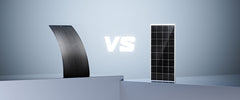
Flexible vs Rigid Solar Panels: Key Differences, Pros, and Best Uses
, 6 Tiempo mínimo de lectura


, 6 Tiempo mínimo de lectura
As RVs, boats, and off-grid living gain popularity, solar panels have become the go-to energy solution for travelers and homeowners. But a common question arises:
“Should I choose flexible or rigid solar panels?”
This guide breaks down the differences, advantages, and best applications for each type—helping you make the right choice for your solar setup.
Rigid panels are made with crystalline silicon cells encased in tempered glass and aluminum frames. They offer:
Common applications: Home rooftops, cabins, large off-grid systems
Flexible panels use thin-film or semi-flexible cells on polymer backing (PET or ETFE), allowing slight bending. They are:
Common applications: RVs, boats, tents, portable solar kits
|
Feature |
Rigid Panel |
Flexible Panel |
|
Efficiency |
Higher (18–22%), ideal for limited space |
Slightly lower (15–19%), suitable for mobile use |
|
Durability |
Strong glass & aluminum design, 20–25 years lifespan |
Prone to scratches and weather wear, shorter lifespan |
|
Weight & Installation |
Heavier, requires brackets and frames |
Lightweight (⅓ of rigid panels), adhesive or Velcro mounting |
|
Flexibility |
Fixed and rigid |
Can bend and conform to curved surfaces |
|
Maintenance |
Minimal maintenance, long-term stability |
Requires periodic checks on the adhesive and wiring |
|
Cost |
Lower price per watt, higher installation cost |
Slightly higher per-watt cost but easier installation |
|
Use Case |
Recommended |
Why |
Example |
|
Fixed rooftop or off-grid cabin |
Rigid panel |
High efficiency, long lifespan, strong wind resistance |
Home roof, cabin |
|
RV, boat, or curved surface |
Flexible panel |
Lightweight, easy to install, fits irregular surfaces |
Camper van roof, sailboat |
|
Portable or temporary setup |
Flexible panel |
Easy to store and deploy anywhere |
Camping, pop-up tent |
|
Long-term high-output system |
Rigid panel |
Reliable and cost-effective for continuous use |
Off-grid solar farm |
Pro Tip: Consider hybrid setups—rigid panels for main power, flexible panels for auxiliary or mobile charging.
Ask yourself these questions before buying:
✅ Quick Takeaway:
Find reliable solar panels for any setup:
👉 RICH SOLAR Solar panels collection
Rigid Panels: High-efficiency and durable—ideal for rooftops and off-grid systems.
Flexible Panels: Lightweight and bendable—perfect for RVs, boats, and curved surfaces.
Built with Grade A cells and made to perform in harsh outdoor conditions for lasting power anywhere.
Both flexible and rigid solar panels have their strengths.
Rigid panels → Long-term, high-efficiency power generation
Flexible panels → Lightweight, versatile, and perfect for mobile living
When choosing, consider your installation space, power needs, and mobility—that’s the key to getting the most from your solar setup.
Explore our complete line of flexible and rigid solar panels for homes, RVs, and off-grid systems. Power your next adventure with smart, reliable solar energy.
Q1: What’s the main difference?
Rigid panels are glass-framed and more durable; flexible panels are lightweight and bendable for curved or mobile surfaces.
Q2: Which is more efficient?
Rigid panels—typically 18–22% vs. 15–19% for flexible panels.
Q3: Which lasts longer?
Rigid panels last up to 25 years; flexible ones usually have a shorter lifespan.
Q4: Are flexible panels good for RVs and boats?
Yes. They fit curved roofs and install easily with adhesive or Velcro.
Q5: Can flexible panels handle harsh weather?
They resist light impact but are less durable than glass panels in extreme heat, cold, or hail.
Q6: Can I mix both types in one system?
Yes, but use an MPPT charge controller for balanced performance.